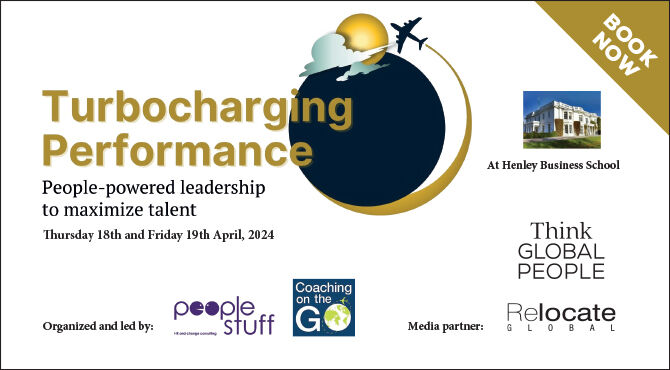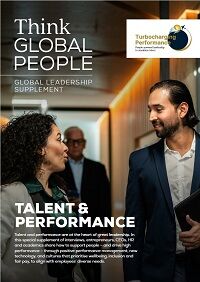Pay and rewards: a high-performance approach
Employers are responding to the cost-of-living crisis, pay inequalities, low economic growth and severe skills shortages with new solutions for talent, reward and performance management. Independent pay and rewards expert Dr Duncan Brown explains how – and why it is important.

This article is taken from the Turbocharging Performance supplement in the Spring 2024 issue of
Think Global People magazine
Click on the cover to access the digital edition.Dr Duncan Brown is a leading commentator on reward issues and one of the UK’s top ten most influential HR thinkers. Co-author of the best-selling ‘A Handbook of Reward Management,’ he is currently a visiting professor at the University of Greenwich and principal associate at IES.In his three decades as a pay expert, consultant and academic, Dr Brown has seen first-hand the impact of technology, demographic change, economic shocks and the shift in value creation from manufacturing to services, technology, knowledge and skills.He has advised employers, HR, government and teaches students on how to calibrate pay and rewards for high employer performance and employee engagement. This includes addressing the increasing divide between the wealthiest and poorest – and therefore wellbeing and social cohesion – the ongoing impact of developments since the 2008 financial crisis on real wages, and the current hot topics of pay equity and transparency.“I think Covid had a massive impact,” says Dr Brown on the question of why now is the time to talk about fit-for-purpose approaches to performance management and reward. “The pandemic made employers rediscover that looking after people and giving them security is pretty important. It might be at the bottom of Maslow’s Hierarchy of Needs, but everything depends on it. If your employees are worried about putting food on the table after sustained cuts to real incomes, then they can’t perform. This is major. Doing a standard pay and benefits review, or looking at what our competitors do, is not going to address it.”“For me, we are at a key decision point,” says Dr Brown. “I’m really pleased and proud that two-thirds of employers did something different through Covid and in the cost-of-living crisis. Having argued inflation is nothing to do with us, we only worry about maximising profits and returns to our shareholders and minimising wage costs; and that financial wellbeing is for banks and employees to deal with, HR leaders and boards.“The question now is are we going to go back to the 2010s approach of maximum employee flexibility and minimum cost, or are we going to say we are going to invest in people and achieve higher returns and value added from growing a higher skilled, better rewarded and more engaged workforce?“The employment market is staying very tight and that is forcing these investments. If you can’t recruit people however much you are paying, then you have no alternative but to ‘grow your own’. These are the real choices employers are facing: recruit or develop in-house, cut employee costs or invest for future higher value-added?“Are you going to take the high road to high performance, or try the cost-focused short-cut that gave us throughout the 2010s stagnant productivity, growing in-work poverty and widening inequality and some of the lowest levels of employee engagement in Europe?”
Read related articles from Relocate Global
- New research highlights need for more human-centric mobility
- The role of employee and family relocation support in the current cost of living crisis
- Total rewards: innovations in global talent management
The high road to economic prosperity
The role of HR and reward expertise remains vital in answering the central question he will be discussing with peers at the upcoming Turbocharging Performance masterclass at Henley Business School in April. This is the question of “how do we leverage high performance in an economy that is stuck in a low-productivity, high-inflation bubble and now recession?”“We are HR and we decide this stuff, even if it is the results of lots of micro decisions,” he says. “We are the ones who decide what to pay and what contracts we offer. We are the ones who decide on risks around what terms and conditions. We implement those zero-hours contracts and non-disclosure agreements and ironically named and ineffective supposedly performance-related pay systems.“What I want to do is challenge people with some of the assumptions around thinking that lowering pay costs under the guise of flexibility is a good thing. Do you publish pay ranges with job ads; are you banning salary history discussions during recruitment; are you using zero-hours contracts?“The answers to these questions help to really understand why companies are doing what they do, and whether that’s in the long-term interest of their company’s performance. I want to challenge people and present what I believe the high-performance model really is; it’s not high executive supposedly-performance-related pay and a minimum wage workforce.”
Leveraging rewards in high-performance cultures
Managing HR budgets, forecasting and workforce planning are fundamentally important issues in a world where people and skills are the source of competitive advantage. New technologies – and how we introduce and embed them – offer scope for more informed decision-making in the quest for high performance and how we can best balance people and performance.These are all highly relevant issues for public and private sector employers, particularly those grappling with the question of how to create a fair and productive workplace where a range of contracts have been introduced for flexibility as well as cost containment. Skills shortages are endemic and while government has a key role here, employers recognise that they are not investing enough in upskilling and reskilling their workforce for the future.“The employment model that a lot of employers have been using since 2010 has really damaged the performance of the economy and a lot of companies,” says Dr Brown. “Now is an interesting time to look at this because Covid showed that things like cutting your sick pay policy is a pretty dumb idea, for example. But lots of companies did it in the 2010s. Or worse, having your executives sitting at home during Covid nice and safe with private medical policies while your frontline key workers are at risk of dying from Covid but have no medical benefits or cover.”Fairness has always been a central consideration in the pay and rewards arena, albeit one tempered by prevailing attitudes to competition for talent. Market-focused pay and incentivisation has contributed to record pay gaps between top executives and the wider workforce, as well as unconscious bias playing into gender, race and disability pay gaps and therefore lifetime earnings and life chances. How does Dr Brown see the link between talent and reward today and in future?“A lot of HR leaders are focusing more on internal talent pipelines because they have no choice,” he says. “Employers can pay what they like, but if there aren’t workers out there, then you have to grow and train them yourself. Performance management not surprisingly is now pivoting back towards what it was when I started in HR, which was about growing your people, developing their strengths rather than punishing their failings in pay. Performance appraisals used to be held six months away from your pay review precisely to avoid a focus on pay and focus more on growing people.”A joined-up approach to performance management
A core aspect of the high-performance approach is recognising the importance of talent retention. This includes creating the conditions for people at all life stages to engage and perform through good management, continuous feedback and supportive workplace cultures.It is an approach in this cost-conscious era that makes the most sense, says Dr Brown. “Around 20% of women leave employment within five years of having a child. Yet most sectors and employers have skills shortages, even though there are still almost a million vacancies while the economy is flatlining.”The obvious danger of such a narrow – and short-term – focus on the salary budgets is that it overlooks and underestimates the actual cost of employee turnover, both in financial terms and long-term performance and productivity. “We just don’t join this up at the moment,” says Dr Brown. This includes making sure pay, benefits and total rewards are relevant, offer value for employees as well as employers, and are communicated effectively.“What HR does is survey and look at what other employers are doing. It’s potentially expensive to get an outside provider in, so companies often wait for government or their competitors to act so then they have no choice but to do the same. Yet the actual cost of losing 20% of people isn’t counted and when it is, it is massively underestimated.” But attitudes have shifted since the pandemic, with the major progress on menopause policies and benefits for example showing that many employers see the importance of better supporting their female workforce.Looking to the future, Dr Brown sees the pendulum swinging back to more skills-based pay as organisations grow their own talent, especially around the introduction of AI introduction. There is also much more awareness around pay equity – a priority for HR directors – and transparency.“It’s a really interesting time right now for reward and performance management for high performance, especially as voluntary attrition remains high,” says Dr Brown. “Most employees can secure higher pay increases by moving employers rather than staying and performing for their existing one.” Creating the conditions for people to stay, flourish and perform is therefore a cost-effective and long-term investment. It pays off economically, socially and personally.
Read the latest issue of Think Global People/Relocate magazine. Read your copy here.
Find out about becoming a Member of our Think Global People community and keep up with our latest events, webinars and podcasts.
 Subscribe to Relocate Extra, our monthly newsletter, to get all the latest international assignments and global mobility news.
Subscribe to Relocate Extra, our monthly newsletter, to get all the latest international assignments and global mobility news. Relocate’s new Global Mobility Toolkit provides free information, practical advice and support for HR, global mobility managers and global teams operating overseas.
Relocate’s new Global Mobility Toolkit provides free information, practical advice and support for HR, global mobility managers and global teams operating overseas.
©2025 Re:locate magazine, published by Profile Locations, Spray Hill, Hastings Road, Lamberhurst, Kent TN3 8JB. All rights reserved. This publication (or any part thereof) may not be reproduced in any form without the prior written permission of Profile Locations. Profile Locations accepts no liability for the accuracy of the contents or any opinions expressed herein.
































